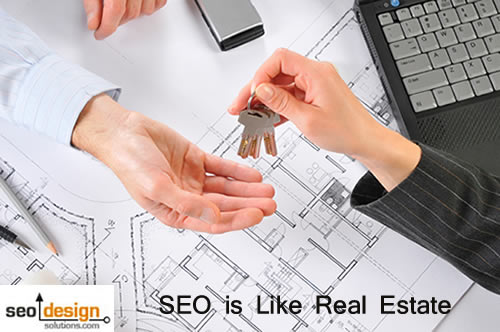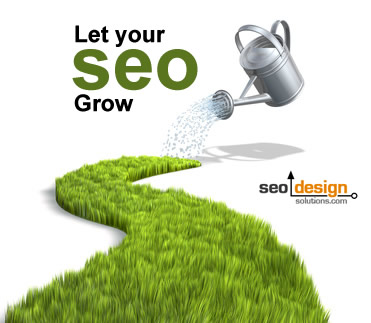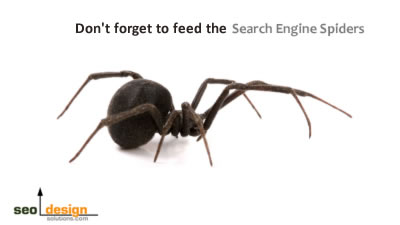With so many analogies to select from, drawing parallels across multiple industries to describe specific aspects of SEO often aids the process of elaborating similar concepts. Today’s analogy for search engine optimization is real estate and the parallels between websites, location (offline and online positioning) and properties.

With SEO, keywords are the equivalent of agents that deliver visitors to your property (your website). You can have the most beautiful luxury property furnished with lavish features and benefits, but without visitors or a buyer to make an offer, its stunning beauty and dashing appearance remain in isolation unappreciated from those whom could benefit from it most.
Websites can also fall prey to this dilemma, built with bells and whistles, feature packed GUI (graphic user interface) amazing dynamic features, but yet, no traffic in site to engage it. Sites suffering from the web design-itis, whereby, design was the focal point and the SEO was ignored during the construction process, often means having to start fresh or conduct a complete overhaul to fine-tune SEO friendly features.
It’s no secret that each page in your site should have something to offer your visitors. Just like at an open house, you put out cookies, coffee or tea to make visitors feel welcome. Online, you have to treat guests with the same degree of integrity by ensuring their comfort is your first priority.
You only have a few seconds to make your impression and see what sticks (hopefully the visitor). We know that shoppers with little time on their hands like the wow factor, but there has to be some real meat underneath all of those flashy features to back it up. Otherwise, if your pages don’t deliver, then it’s back to the search engine to refine their search and “poof”, one less concern for your sites bottom line to worry about.
This is where SEO can differentiate your website from the crowd. At the expense of throwing in another cliche, content is king and with that in mind unique content is essential to differentiate your offer. Sometimes it’s about not letting traffic slip away as opposed to driving more traffic.
Differentiation is important when there are automated elements (such as information parsed from an MLS feed in the real estate industry), shopping cart mfg. data in e-commerce and the me too websites in most industries. So, this is where minor elements that differentiate the user experience and leave them with something tangible as a clear asset above your competition can pay it forward when it is decision making time.
Things like email alerts, personalized CRM processes such as a database driven app that emails related information based on their surfing habits (we see you went to page A, perhaps items on page B would also appeal to your query).
The key to SEO is, understanding your visitors enough to know that online real estate (your website), is no different than offline real estate, except for in this case it’s digital property.
Offline, there is a finite amount of land available that is desirable, yet the number of people that want it keep increasing (which creates the dynamic of supply and demand). Which means, if the property / website it is prime, then you can rent it (for impressions to reach a targeted audience).
With the same logic intact, its always better to sell traffic than buy it, and quite frankly while monetization may be an entirely different topic, both are driven by the bottom line… motivated buyers and traffic.
Online, this is the basis of advertising and targeted ads. Traffic and an audience are a given (if the location) in this case (topic) is relevant. So, what it boils down to is “your message” and how appealing it is to your target user / buyer / consumer.
At this stage, SEO is just establishing itself as a prerequisite / commodity for any online endeavor. Sure, you can have a website without using SEO, but how can you compete with someone who has not only embraced the concept, but who is really good at it and has a year head start in your niche?
The natural reaction for most entering a competitive channel is pour money into pay per click and by renting attention share from other related prime online real estate / web properties.
Just like any type of real estate, you can have the greatest property (website) but you still have to sell it (in this case the content needs to sell the visitor). Having said that, just like an agent can show a property time and time again and not close the deal, websites without images that have positive interaction, a call to action or user engagement can also fall flat with traffic.
Value is subjective and relevance is the bottom line. I may joke about things such as the analogy of trying to sell ice cubes to to Eskimos, but the reality is, its all about positioning needs with solutions bound by desire and intention.
Just like you can bring a horse to water and can’t make them drink, let go of the dated model of traffic for traffic’s sake and target your keywords, content and context of your website to appeal to a very specific type of consumer such as condos vs. the entire real estate market.
In most instances, it is not the fault of the visitor for failing to taking action, it’s just a case of marketing the wrong message to the wrong person at the wrong time or wrong sales cycle.
Figuring out which message is ideal for your audience translates into a happy transaction time and time again. However, without traffic in sight, from lack of promotion, the only thing you can expect is to keep dusting cobwebs off of the furniture (dated pages).
Just like a makeover can transform a dated look, content can refresh and reinvigorate a dilapidated online property. If all else fails, consider SEO web design. Yet, if the real problem is just traffic (or lack of it) then create a scalable solution (by adding a new section such as a blog), revising dated descriptions or cookie cutter information and adding a few calls to action that offer value through and through.
All you need is a higher percentage of conversion in most instances, not more nebulous traffic. So, the more clear you are about who your target user is, understanding the triggers that encourage them to take action, how far along in the sales cycle they are and how your website / property IS the SOLUTION can cut your selling time in half.









As a real estate agent who does do my own SEO this is a very good analogy and should be seen as a persuasive argument that all website owners to consider a strong SEO plan. Now that my real estate site is maturing and getting traffic I find myself focusing more on ways to improve the user experience – not enough to just get them there even if I have a very good conversion ratio-seems like there is always ways to improve.
Very interesting post. And we have tried ot convince some customers that SEO doesn’t affect your profitability, since it is your asset.
This post influenced me to post this post in my blog: http://marketinggossip.blogspot.com/2009/04/is-seo-expenditure-is-expense-or-asset.html (Is SEO Expenditure an Expense or Asset? Or Does SEO Cost influence Profitability?)